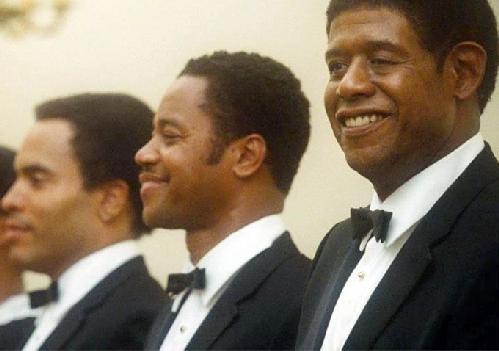The Waldorf Astoria in NYC welcomed journalists, reports
and bloggers for an intimate conversation with the director Lee Daniels
(“Precious”)– of "The Butler" and
the thespians of what is being hailed the best film of 2013. We (the press)
gathered on the 18th floor and were served breakfast and greeted by friendly
staffers. The press conference began with an introduction of the panel– Oprah, Cuba
Gooding Jr, Mariah Carey, Terrence Howard and more names that reek of
super-stardom were introduced individually as they walked to their seats and
made themselves available for questioning. Things began cordial enough, acclaim
for the movie filled the room until one film critic, by the name of Lavar
Renee, announced herself. Oprah, Forest Whitaker and Lee Daniels immediately
grabbed hands, noticeably praying for mercy. Turns out, they were correct in
their assumptions, because the “critic” was ready to dish out an unnecessary and
tactless lashing. In Daniel’s defense, he gave the bet answer anyone could
dream of!
Lavar
Renee: Thank you and
congratulations to each of you. My name is Lavar Renee (sp) and I’m a film
critic, so my question is going to be a concern that I had in watching the
movie. No Lee, that’s not necessary… And a trend that I see in many current
movies and that is the inauthenticity in casting. When I saw the young man who
was to portray John F. Kennedy. I was concerned because there was a disconnect
between the president and what I saw. And that was true for Reagan as well as
LBJ. My question is will you explain how you cast when you are producing and
directing a biopic which is supposed to reflect truth of reality?
Lee Daniels: Well let me first, let me ask you a question, did you
like them as those characters?
LR: I did not.
Daniels: Ok. Well that is…I’m sorry that you felt that way…
LR: I liked the movie…
Daniels: Oh good…
LR: I just was concerned, when I saw these I said ‘why aren’t
they real?’ Another point and then I’ll sit down. When Louis was presenting
himself at the table as a panther, I interviewed panthers, they did not look
the way he was dressed and attired. So that’s what threw me off but I liked the
movie and I commend each of you. Thank you.
Daniels: Thank you. Let me first address the panther. I’ve had
uncles that were panthers and Louis was based on my uncles that were panthers.
So you might have interviewed panthers, ma’am, but I have lived with them and
I’m proud of my uncles that were panthers. And in regards to the presidents I
think they have done a tour de forcible job and I think that’s what makes
me a filmmaker and you an interviewer. Next!
--courtesy, Madamenoire.com













